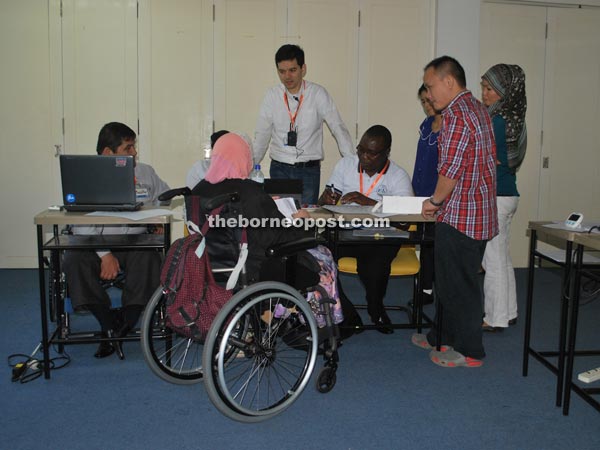The course that changed my life
by Peter Tan. Posted on July 26, 2014, Saturday
MY involvement with Disability Equality Training (DET) began in 2005, when I attended the first Training of Trainers course organised in Malaysia. This course was for disabled people who wanted to become DET trainers and conduct workshops for the public.
As a greenhorn with scant understanding about disability issues other than my own experience as a disabled person for 21 years, I went with an open mind and came out richer in knowledge. I attended subsequent courses to learn more on the finer points of conducting these workshops.
Disability is not a subject one can fully comprehend in just a few days of learning. The first course opened my eyes. It was not an easy journey after that as the new-found knowledge I gained gave rise to even more questions about my identity in relation to my impairments. It took me many more years of trying to make sense of what I had learnt to realise I have a rightful place as an equal in society.
DET provides a logical explanation on why people are disabled. It propounds disability as a social issue, inequality and discrimination instead of functional issues of individuals. There is no correlation between impairment and disability. People do not become disabled just because they cannot walk or cannot see.
When I had it all figured out, I became empowered and recognised that the difficulties I face every day are of social construct. I am disabled because of man-made barriers, prejudices and lack of reasonable accommodation. For example, before the course, I used to think that I could not go out because I could not walk. Now, I realise that my mobility outside is restricted by the lack of an accessible built environment and public transport.
This change of mindset may seem easy to achieve but the truth is that many disabled people have difficulty making the paradigm shift. The years of being subtly programmed to accept their impairments as the cause of the problems they face make them resistant to accept this notion because it challenges the very core of their beliefs.
In either of the Training of Trainers course or public workshops, we as trainers do not impose our values regarding disability on the participants. We facilitate. We guide. And we trust that each and every one of them have the innate ability to understand the causes of disability through a process of critical thinking and self-discovery, if not during the course, then any time after the course.
This is a more effective learning experience as compared to feeding them with answers which they may never be able to remember soon afterwards. What is important is that we have planted the seeds of change in them that will eventually grow and flourish.
DET is not purely knowledge-based. It emphasises more on actions and outcomes. It recognises that people generally do not set out to discriminate intentionally. It is done out of ignorance of the needs of disabled people.
DET supports participants to move from ignorance to becoming change agents and make society inclusive through the implementation of action plans they draw up themselves.
I have no regrets spending the last 10 years of my life in pursuit of knowledge and skills on DET. My outlook on life has changed for the better. If anything, I have become confident of who I am. I have stopped seeing my impairments as impediments. Consequently I developed a positive self-esteem and a sense of self-worth. Most of all, I find it most fulfilling when I am able to make my participants see the reality of disability and realising that they too can play a part in removing societal barriers.
I am glad I stuck at it although the 10-day courses were tough on me mentally and physically. As I look back, I can see how much I have grown. From one who was searching for my place in this world, I have now graduated to conducting Training of Trainers course to cultivate a new generation of trainers. Personally, I have learnt to be a better listener and be non-judgemental, two important attributes DET trainers must possess.
As such, I strongly encourage disabled people who are interested in making a difference to their own lives and in society to seriously consider participating in the Training of Trainers course that the Welfare Department and the Japan International Cooperation Agency (Jica) is organising for trainers and senior trainers in January next year.
The courses will be held at the Training Institute of the National Council of Welfare and Social Development Malaysia in Kuala Lumpur. Participation is limited to 16 for trainers and four for senior trainers. The senior trainers course is for DET trainers who have completed previous Jica DET courses. Application is also open to international participants. This is to be the last DET course funded by Jica under the Project to Support Participation of Persons with Disabilities – Phase 2.
General information and application forms can be found at www.petertantraining.com.
Read more: http://www.theborneopost.com/2014/07/26/the-course-that-changed-my-life/#ixzz3EwbzmWGb

